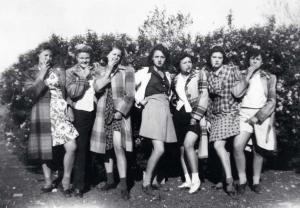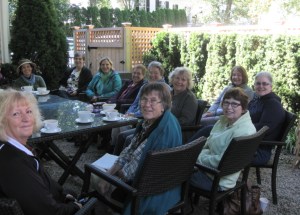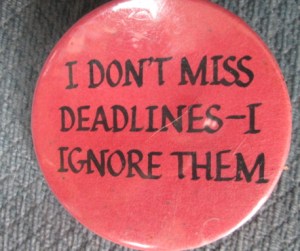Last fall, in “Going Public,” I blogged about Writers Read, a writers’ group hosted by the library in my town of West Tisbury, Massachusetts. At each meeting, six or seven writers read short works or excerpts from long ones — the length limit of 9 minutes is strictly enforced by the moderator. All are invited to comment on each reading, with a focus on personal response to the work. This is not a critique group. Writers Read has developed a core of regulars, with other writers dropping in from time to time.
Marjorie Turner Hollman, writer and blogger, was taken with the idea and contacted me for details on how this group worked. Her local library, in Bellingham, Massachusetts, was interested in starting a local writers’ group. One thing led to another, and this spring the group was launched, with Marjorie and another writer as co-leaders. Starting from the Writers Read idea, they’re adapting it to the needs and desires of the participants. Here’s her account of how it’s working so far.
By Marjorie Turner Hollman
Our first night was a “get acquainted” sort of gathering, checking in to see what writing interests each person had, and what they might be looking for from the group. It turned out we had attracted several poets, some who write in free verse, others who adhere strictly to rhyming schemes. Several participants write science fiction, or a combination science fiction/dystopia, and some write strictly personal stories — memoir.
A few people didn’t bring anything to read, so we suggested taking ten minutes at the beginning of the meeting to write. My co-leader suggested as a topic, “First day of class.” Those who were a little nervous about the group laughed, appreciating the acknowledgment of first-day jitters.
And then we shared. Some read their responses to the writing prompt, others brought in pieces that felt raw with emotion, and while others offered their most highly polished piece for display. Regardless, we listened, and provided positive feedback only. We agreed that we were not looking for a group that offered destructive observations — most of us are already hard enough on ourselves. Our basic ground rules were: no politics, no religion, and leave the erotica at home where it belongs.
A month later, our second gathering resumed with much the same structure, except that this time we came ready with a writing prompt. In fact, we offered two: “What are your writing goals?” or “Tell a story about one experience with the library and how it has changed your life.”
As we worked our way around the table during this second meeting, my co-leader Amy suggested that since we are meeting only once a month, perhaps our group could create a private Facebook page as a place to share resources and blogs that we write. Having made the suggestion, Amy was quickly nominated to put the Facebook group together. Entry to the group is limited to those who have physically come to at least one of our meetings at the library. We are seeking to set healthy limits on discussion, and foster an environment that can encourage tender creative efforts to blossom, rather than be squashed by overzealous, well-meaning folks who offer observations or criticisms that are, intentionally or not, destructive.
And so we continue, grateful for the seed that was planted when Susanna wrote about the impact her writing group has had on her as a writer. I feel sure that we have veered away from the format developed on Martha’s Vineyard. We are finding our own way, and our group is already taking on a character of its own. Regardless of how different our group becomes, I feel grateful for the encouragement we received, Susanna’s patience in explaining their process, and interest in hearing about how our group is doing. So here’s to you on Martha’s Vineyard — Happy Writing!
* * * * * * *

Marjorie Turner Hollman
Marjorie Turner Hollman is a personal historian who loves the outdoors, and is the author of Easy Walks in Massachusetts, 2nd edition, and More Easy Walks in Massachusetts. She has been a freelance writer for numerous local, regional, and national publications for the past 20 years, and has recorded 14 veteran’s oral histories, now housed at the Library of Congress.
Her website includes more information about her and her work, and a blog about her walking adventures. Her account of the first meeting of the Bellingham library writer’s group can be found in the Bellingham Bulletin for May 31, 2017.





 Why do you write flash? What makes it different for you?
Why do you write flash? What makes it different for you?


 Most editors and writers have mixed feelings about deadlines. We love them when we’ve met them, not least because if this is a paid gig the check will shortly be in the mail or payment will land in our bank account.
Most editors and writers have mixed feelings about deadlines. We love them when we’ve met them, not least because if this is a paid gig the check will shortly be in the mail or payment will land in our bank account.